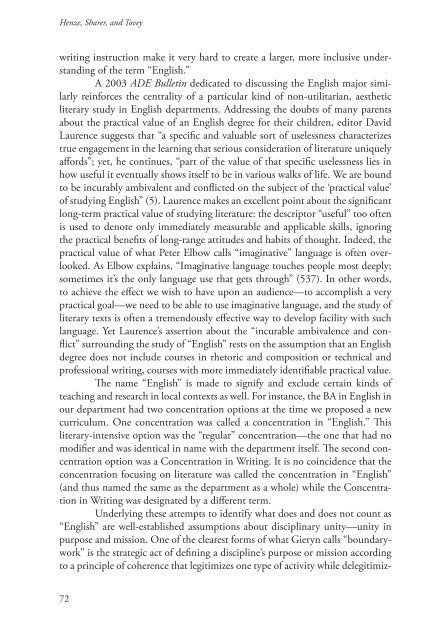Design Discourse- Composing and Revising Programs in Professional and Technical Writing, 2010a
Design Discourse- Composing and Revising Programs in Professional and Technical Writing, 2010a
Design Discourse- Composing and Revising Programs in Professional and Technical Writing, 2010a
Create successful ePaper yourself
Turn your PDF publications into a flip-book with our unique Google optimized e-Paper software.
Henze, Sharer, <strong>and</strong> Tovey<br />
writ<strong>in</strong>g <strong>in</strong>struction make it very hard to create a larger, more <strong>in</strong>clusive underst<strong>and</strong><strong>in</strong>g<br />
of the term “English.”<br />
A 2003 ADE Bullet<strong>in</strong> dedicated to discuss<strong>in</strong>g the English major similarly<br />
re<strong>in</strong>forces the centrality of a particular k<strong>in</strong>d of non-utilitarian, aesthetic<br />
literary study <strong>in</strong> English departments. Address<strong>in</strong>g the doubts of many parents<br />
about the practical value of an English degree for their children, editor David<br />
Laurence suggests that “a specific <strong>and</strong> valuable sort of uselessness characterizes<br />
true engagement <strong>in</strong> the learn<strong>in</strong>g that serious consideration of literature uniquely<br />
affords”; yet, he cont<strong>in</strong>ues, “part of the value of that specific uselessness lies <strong>in</strong><br />
how useful it eventually shows itself to be <strong>in</strong> various walks of life. We are bound<br />
to be <strong>in</strong>curably ambivalent <strong>and</strong> conflicted on the subject of the ‘practical value’<br />
of study<strong>in</strong>g English” (5). Laurence makes an excellent po<strong>in</strong>t about the significant<br />
long-term practical value of study<strong>in</strong>g literature: the descriptor “useful” too often<br />
is used to denote only immediately measurable <strong>and</strong> applicable skills, ignor<strong>in</strong>g<br />
the practical benefits of long-range attitudes <strong>and</strong> habits of thought. Indeed, the<br />
practical value of what Peter Elbow calls “imag<strong>in</strong>ative” language is often overlooked.<br />
As Elbow expla<strong>in</strong>s, “Imag<strong>in</strong>ative language touches people most deeply;<br />
sometimes it’s the only language use that gets through” (537). In other words,<br />
to achieve the effect we wish to have upon an audience—to accomplish a very<br />
practical goal—we need to be able to use imag<strong>in</strong>ative language, <strong>and</strong> the study of<br />
literary texts is often a tremendously effective way to develop facility with such<br />
language. Yet Laurence’s assertion about the “<strong>in</strong>curable ambivalence <strong>and</strong> conflict”<br />
surround<strong>in</strong>g the study of “English” rests on the assumption that an English<br />
degree does not <strong>in</strong>clude courses <strong>in</strong> rhetoric <strong>and</strong> composition or technical <strong>and</strong><br />
professional writ<strong>in</strong>g, courses with more immediately identifiable practical value.<br />
The name “English” is made to signify <strong>and</strong> exclude certa<strong>in</strong> k<strong>in</strong>ds of<br />
teach<strong>in</strong>g <strong>and</strong> research <strong>in</strong> local contexts as well. For <strong>in</strong>stance, the BA <strong>in</strong> English <strong>in</strong><br />
our department had two concentration options at the time we proposed a new<br />
curriculum. One concentration was called a concentration <strong>in</strong> “English.” This<br />
literary-<strong>in</strong>tensive option was the “regular” concentration—the one that had no<br />
modifier <strong>and</strong> was identical <strong>in</strong> name with the department itself. The second concentration<br />
option was a Concentration <strong>in</strong> Writ<strong>in</strong>g. It is no co<strong>in</strong>cidence that the<br />
concentration focus<strong>in</strong>g on literature was called the concentration <strong>in</strong> “English”<br />
(<strong>and</strong> thus named the same as the department as a whole) while the Concentration<br />
<strong>in</strong> Writ<strong>in</strong>g was designated by a different term.<br />
Underly<strong>in</strong>g these attempts to identify what does <strong>and</strong> does not count as<br />
“English” are well-established assumptions about discipl<strong>in</strong>ary unity—unity <strong>in</strong><br />
purpose <strong>and</strong> mission. One of the clearest forms of what Gieryn calls “boundarywork”<br />
is the strategic act of def<strong>in</strong><strong>in</strong>g a discipl<strong>in</strong>e’s purpose or mission accord<strong>in</strong>g<br />
to a pr<strong>in</strong>ciple of coherence that legitimizes one type of activity while delegitimiz-<br />
72


















